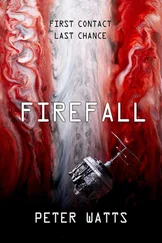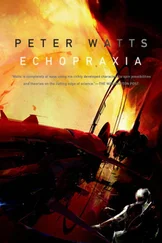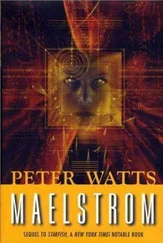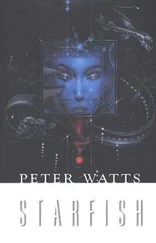Even the deadman alarms were an afterthought, Clarke remembers. Karl Acton brought them down to Beebe at the start of his tour, handed them out like throat lozenges, told everyone to pop themselves open and slide 'em in right next to the seawater intake.
Karl was the one who discovered how to do what Lenie Clarke is doing right now. Ken Lubin killed him for it.
Times change , Clarke reflects, and tweaks another setting.
Finally she's finished. She lets the fleshy flap fall back into her chest, feels the phospholipids rebind along the seam. Molecular tails embrace in an orgy of hydrophobia. Another ache throbs diffusely inside now, subtly different from those that have gone before: disinfectants and synthetic antibodies, spraying down the implant cavity in the unlikely event that its lining should fail.
The outraged handpad has given up; half of its readouts are yellow and orange.
Inside Clarke's head, things are beginning to change. The permeability of critical membranes is edging up a few percent. The production of certain chemicals, designed not to carry signals but to blockade them, is subtly being scaled back. Windows are not yet opening, but they are being unlocked.
She can feel none of this directly, of course. The changes, by themselves, are necessary but not sufficient—they don't matter here where lungs are used, where pressure is a mere single atmosphere. They only matter when catalyzed by the weight of an ocean.
But now, when Lenie Clarke goes outside—when she steps into the airlock and the pressure accretes around her like a liquid mountain; when three hundred atmospheres squeeze her head so hard that her very synapses start short-circuiting—then, Lenie Clarke will be able to look into men's souls. Not the bright parts, of course. No philosophy or music, no altruism, no intellectual musings about right and wrong. Nothing neocortical at all. What Lenie Clarke will feel predates all of that by a hundred million years. The hypothalamus, the reticular formation, the amygdala. The reptile brain, the midbrain. Jealousies, appetites, fears and inarticulate hatreds. She'll feel them all, to a range of fifteen meters or more.
She remembers what it was like. Too well. Six years gone and it seems like yesterday.
All she has to do is step outside.
She sits in her cubby, and doesn't move.
Find the damn mines.
They spread out across the territory like black dogs, sniffing through light and shadow with sonar pistols and flux detectors. Some of them may question the exercise—and some of them almost certainly root for its failure—but nobody still alive after five years down here is going to be dumb enough to go all insubordinate on Ken Lubin.
Find the damn mines .
Clarke glides among them, just another nose on the trail as far as anyone can tell. Hers is not so focused, though. The others follow invisible lines, the threads of a systematic grid laid down across the search area; but Clarke zigzags, coasts down to accompany this compatriot or that, exchanging insignificant bits of conversation and intel before diverging courses in search of new company. Clarke has a different mission.
Find the damn mine-layer.
Hectares of biosteel. Intermittent punctuations of light and shadow. Flashing staccatos at each extremity, little blinking beacons that announce the tips of scaffolds, antennae, danger zones where hot fluids might vent without warning. The baleful, unwavering glare of floodlights around airlocks and docking hatches and loading bays, reignited for today's exercise. Pale auras of wasted light from a hundred parabolic viewports. Twilit expanses of hull where every protuberance casts three or four shadows, dimly lit by lamps installed in more distant and glamorous neighborhoods.
Everywhere else, darkness. Elongated grids of shadow laid out by naked support struts. Impenetrable inky pools filling the spaces between keel and substrate, as though Atlantis were some great bed with its own scary place for monsters lying beneath. Fuzzy darkness where the light simply attenuates and fades; or razor-sharp where some tank or conduit extends into bright sodium sunlight, laying inky shadows over whatever lies beneath.
More than enough topography to hide an explosive device barely twice the size of a man's hand. More than enough to hide a thousand.
It would be a big enough job for fifty-eight. It's a lot bigger for the two dozen that Lubin is willing to conscript to the task; rifters who haven't gone native, who don't overtly hate the corpses enough to leave suspicious-looking objects «unnoticed» in their sweep—rifters who aren't among the most likely to have planted such devices in the first place. It's nowhere near a sure thing, of course; few of these people have been cleared as suspects. Not even the intel stolen directly from their brainpans is incontrovertible. They didn't hand out the eyes and the 'skin to anyone who didn't have a certain history, twisted wiring is what suits a body to the rift in the first place. Everyone's haunted here. Everyone carries their own baggage: their own tormentors, their own victims, the addictions, the beatings and the anal rapes and the paternal fondling at the hands of kindly Men In Black. Hatred of the corpses, so recently abated, is once again a given. ß-max has brought all the old conflicts back to the surface, reignited hostilities that five years of grudging, gradual coexistence had begun to quench. A month or two past, rifters and corpses were almost allies, bitter holdouts like Erickson and Nolan notwithstanding. Now, few would shed many tears if the ocean crashed in on the whole lot of them.
Still. There's a difference between dancing on someone's grave and digging it. There's an element of, of calculation on top of the hatred. Of planning. It's a subtle difference; Clarke doesn't know if she or Lubin would be able to pick it up under these circumstances. It might not even manifest itself in someone until the very moment they came upon the incriminating object, saw the mine stuck to the hull like some apocalyptic limpet, tripped their vocoder with every intention of raising the alarm and then—
Maybe the bastards deserve it after all they've done to us, after all they've done to the whole world, and it's not like I set the damn thing, it's not like I had anything to do with it except I maybe just didn't notice it there under the strut, perfectly understandable in the murk and all…
Any number of minds could seem perfectly innocent—even to themselves— right up to the point at which that last-wire stimulus came into view and catalyzed a simple chain of thought that ends in just looking the other way. Even then, who knows whether fine-tuning might pick it up?
Not Lenie Clarke. She searches anyway, gliding between the hulls and the storage tanks, flying over her fellows searching the lights and the shadows, only ostensible in her hunt for ordinance.
What she's really hunting is guilt .
Not honest guilt, of course. She's trolling for fear of discovery, she's on the prowl for righteous anger. Newly reawakened, she swims through a faint cauldron of secondhand emotions. The water's tainted with a dozen kinds of fear, of anger, with the loathing of self and others. A darker center roils beneath the surface of each dark body. There's also excitement of a sort, the initial thrill of the chase decaying exponentially down to rote boredom. Sexual stirrings. Other, fainter feelings she can't identify.
She's never forgotten why she resisted fine-tuning back at Channer, even after all the others had gone over. Now, though, she remembers why she found it so seductive when she finally gave in: in that endless welter of feelings, you always lost track of which ones were yours…
Читать дальше









